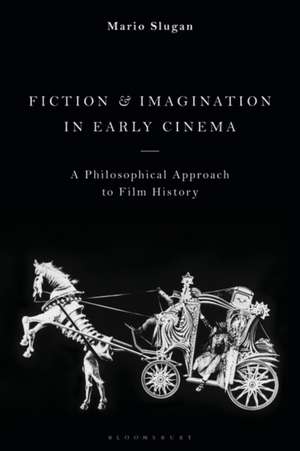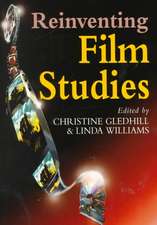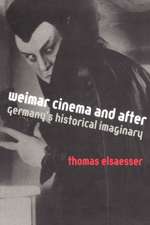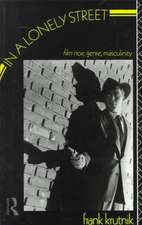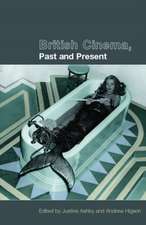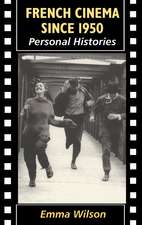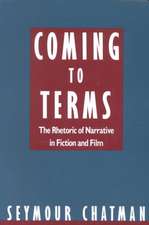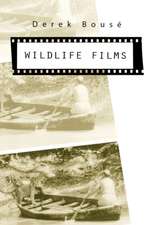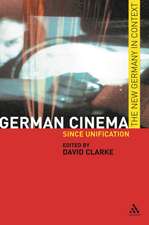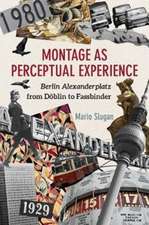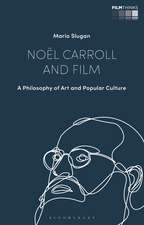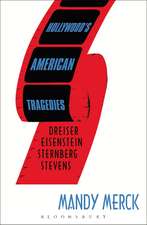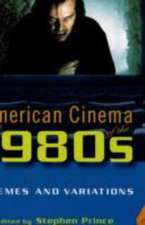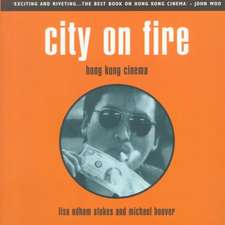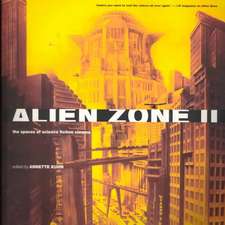Fiction and Imagination in Early Cinema: A Philosophical Approach to Film History
Autor Mario Sluganen Limba Engleză Paperback – 19 mai 2021
| Toate formatele și edițiile | Preț | Express |
|---|---|---|
| Paperback (1) | 218.65 lei 6-8 săpt. | |
| Bloomsbury Publishing – 19 mai 2021 | 218.65 lei 6-8 săpt. | |
| Hardback (1) | 657.70 lei 3-5 săpt. | |
| Bloomsbury Publishing – 27 noi 2019 | 657.70 lei 3-5 săpt. |
Preț: 218.65 lei
Preț vechi: 275.40 lei
-21% Nou
Puncte Express: 328
Preț estimativ în valută:
41.84€ • 43.77$ • 34.76£
41.84€ • 43.77$ • 34.76£
Carte tipărită la comandă
Livrare economică 03-17 aprilie
Preluare comenzi: 021 569.72.76
Specificații
ISBN-13: 9781350194816
ISBN-10: 1350194816
Pagini: 280
Ilustrații: 30 bw illus
Dimensiuni: 156 x 234 x 22 mm
Greutate: 0.4 kg
Editura: Bloomsbury Publishing
Colecția Bloomsbury Academic
Locul publicării:London, United Kingdom
ISBN-10: 1350194816
Pagini: 280
Ilustrații: 30 bw illus
Dimensiuni: 156 x 234 x 22 mm
Greutate: 0.4 kg
Editura: Bloomsbury Publishing
Colecția Bloomsbury Academic
Locul publicării:London, United Kingdom
Notă biografică
Mario Slugan is Lecturer at the Department of Film of Studies, Queen Mary University of London. He is the author of Montage as Perceptual Experience: Berlin Alexanderplatz from Döblin to Fassbinder (2017) and Noël Carroll and Film: A Philosophy of Art and Popular Culture (Bloomsbury Academic, 2019). He is also Fellow of the Society for the Cognitive Studies of the Moving Image, editor of the open-access peer-reviewed academic journal Apparatus: Film, Media and Digital Cultures of Central and Eastern Europe and book reviews editor of Early Popular Visual Culture.
Cuprins
List of Figures and Tables Acknowledgements Introduction 1: The Status of Fiction in Early Cinema: Train and Trick Films ARE THERE TEXTUAL CRITERIA FOR FICTIONALITY? EXTRA-TEXTUAL CRITERIA OF FICTIONALITY RECEPTION AND EXHIBITION CONTEXT TRAIN FILMS AND THE ARRIVAL OF A TRAIN THE IMPORTANCE OF EXHIBITION CONTEXT AND MAGIC THEATREA TRIP TO THE MOON AND TRICK FILMS PRODUCTION AND PROMOTION CONTEXT2: Hale's Tours and Adjacent Cultural Series: Illusion, Immersion, Imagination PANORAMAS AND TERMINOLOGICAL CONFLATION: ILLUSION, IMMERSION, IMAGINATION TRAVELOGUES AS ERSATZ-TOURISM: ANY PLACE FOR IMAGINATION? PHANTOM RIDES: FROM FICTION OF TRAVEL TO NON-FICTION OF PLACE HALE'S TOURS THE MYTH OF A 'DEMENTED FELLOW' HISTORICIZING THE IMAGINED SEEING THESIS 3: Re-enactments in Early Cinema: Fake, Fiction, Fact WHAT IS A FAKE?FAKES, INDEXICALITY AND FICTIONALITYFAKES AND IMAGINARY PARTICIPATION 4: The Lecturer and Make-Believe: The Borders of the Text and Explicit MandatesTHE RELATION OF THE FILM LECTURER TO THE TEXT IDEAL, PRINTED, AND DELIVERED LECTURESTHE LECTURER AND THE PERFORMANCE OF THE FILM NARRATOR THROUGH DEIXIS 5: Implicit Mandates and Fictional Narrators NARRATIVE AND NARRATOR IN EARLY CINEMA NARRATIVE NARRATOR CONTEMPORARY NARRATOLOGICAL DISCOURSE GENETTE'S THEORY OF VOICE THE NEAR-UBIQUITY THESIS FOR LITERARY FICTION THE NEAR-ABSENCE THESIS FOR FICTION FILM THE ENUNCIATOR AS THE FILMIC NARRATOR THE RETURN OF THE GREAT-IMAGE MAKER EXCEPTIONS TO NEAR-ABSENCE THESIS FOR FICTION FILMConclusion Bibliography
Recenzii
I highly recommend it. Dense with period references and informed by analysis drawn from film theory and historiography, it offers comprehensive, insightful and well-informed discussions of imagination, fiction and make-believe in the experience of film during the late C19th and early C20th.
